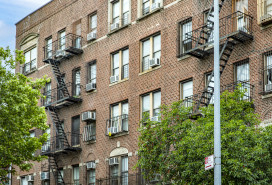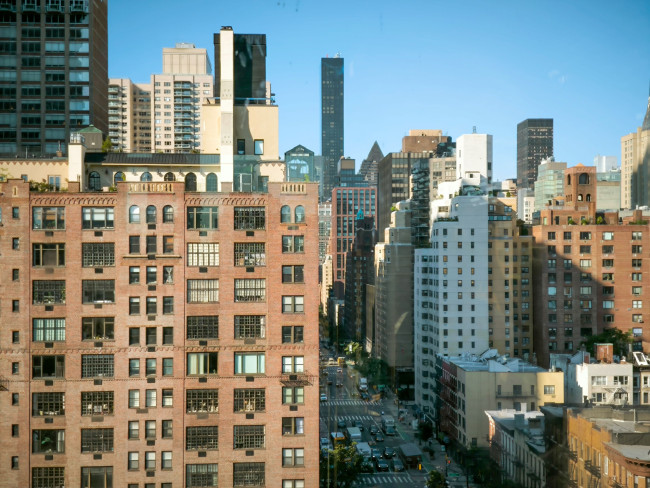2025 NYC real estate forecast: Buyers and sellers tango, renters hold their breath
- Sellers remain in the driver’s seat thanks to limited listings
- Buyers accept ‘new normal’ for stubbornly high mortgage rates
- Renters may forgo broker fees if FARE Act survives REBNY lawsuit

Don’t count on mortgage rates to drop dramatically in 2025—they are expected to spend most of the year in the 6 percent range.
iStock
In 2024, mortgage rates were stubbornly high, despite three interest rate cuts by the Federal Reserve—due to faster-than-expected economic growth and inflation concerns.
Those rates kept many owners “locked-in,” unwilling to sell and give up their low interest rates. On the other side, high prices and a lack of inventory kept a lot of would-be buyers in rentals and this raised competition for apartments—a continuation of a trend seen in previous years.
Looking ahead this year, with only two (or three) interest rate cuts expected, don’t count on mortgage rates to drop dramatically—they are likely to bounce around the six percent range. But more NYC sales are in the cards for 2025, thanks in part to borrowers willing to accept the “new normal” for mortgage rates—and at the higher end—buyers benefitting from higher Wall Street bonuses.
As for renters, when buyers move on, rents will likely drop—or at least remain flat. And there could be a big shake up come June when the FARE Act, the new broker fee law takes effect—if it survives a legal challenge.
Whether you plan on buying, selling, or renting a new place, here’s what you need to know to achieve your real estate goals this year.
What to expect if you’re a renter: An uncertain fate for the new broker fee law
Competition for NYC rentals will remain high going into the new year but is expected to ease a bit when mortgage rates eventually dip.
That is what happened in the second half of 2024. Median rents for new leases declined as a slip in mortgage rates encouraged some would-be buyers to make their move out of the rental market. That in turn relieved some pressure on demand for rentals.
However, by the end of the year—when mortgage rates stopped falling—NYC rents started to climb again, and so did bidding wars. Manhattan median rent jumped 5 percent to $4,200 in November 2024 compared to the prior year, according to the Elliman Report.
"For the second month in a row we're seeing rents pop, and that's stemming from mortgage rates, which are staying put. There have been some dips, but they're nominal," Jonathan Miller, president and CEO of appraisal firm Miller Samuel and author of the report, previously told Brick. "The expectation is that inflation will continue to be an issue next year, which will keep mortgage rates elevated."
Miller said he's anticipating that rents will continue to trend higher as a result.
Only two or three interest rate cuts are expected this year, a shift from previous forecasts of four cuts. That may encourage some would-buyers who need financing to put off purchasing until borrowing conditions improve more significantly.
When that finally happens, more buyers will leave rentals behind. “This should allow inventory levels to ease up in the rental market. Naturally, this would be indicative of rents coming down as well,” said David Sokolowski, a broker at Coldwell Banker Warburg.
Farewell to broker fees?
There’s debate over whether the new NYC broker fee law could lead to higher rents.
The FARE Act, introduced by City Council member Chi Ossé, requires owners to pay their brokers’ fees instead of the longstanding practice of charging the renter. On Nov. 13th, a veto-proof majority of 42 members voted in favor of the bill. The law removes an expensive, upfront cost to renters since broker fees can range from 10 to 15 percent of the annual rent.
The Real Estate Board of New York, NYC’s powerful real estate trade association, was vocal in its opposition, arguing that the new law would lead to higher rents because owners would roll broker fees into new leases, creating a higher base rent that tenants pay in perpetuity. But StreetEasy, other listing site founders, and even some brokers disagree with that prediction.
Zachary Haigney, an agent at Compass, is one of them. He said he doesn’t see rents increasing greatly as a result of the FARE Act.
“Rents are already high, how much higher can they go? Owners will still want to attract quality tenants,” he said. By raising rents to cover the broker fee, landlords would be “squeezing the market smaller” and narrowing the pool of qualified renters, he added.
Will REBNY’s suit block the FARE Act?
The FARE Act automatically became law last month without Mayor Eric Adams’s signature. But days later, the Real Estate Board of New York filed a lawsuit to block the law from taking effect in mid-June, senior writer Celia Young reported.
"The FARE Act is bad policy and bad law,” said Carl Hum, REBNY’s general counsel, in a statement. “This legislation will not only raise rents and make it harder for tenants to find housing but it also infringes upon constitutional guarantees of free speech and contract rights, as well as New York State law.
The lawsuit argues that the FARE Act violates brokers’ first amendment right to publish an open listing and violates the contracts clause of the U.S. Constitution because it prevents brokers from entering a contract with a landlord to advertise their apartment, and then “seek compensation from the tenant.”
And the lawsuit argues that it should be up to the state, not the city, to regulate brokers and their fees.
“This lawsuit is a last desperate attempt by the real estate lobby to undermine the voices of city residents and maintain an irrational practice that nearly every other big city in the country does not allow,” Ossé previously told Brick.
Interestingly, the week after the FARE Act passed, Rachel Fiegler, co-founder of the Pinpointe Group, a boutique brokerage, told Brick that a few landlords they work with updated pricing across their portfolios. The owners are offering to pay the fee and have increased rent across all rent on average about 8 percent, she said.
“Renters don’t care that the law doesn’t go into effect till June. They read the news and expect results immediately,” Fiegler said.
Growing awareness of ‘Good Cause’
In April, many NYC market-rate tenants gained new protections from eviction and big rent hikes when state legislators finally passed a Good Cause eviction law.
Now landlords must have a good reason to evict a market-rate tenant and are required to justify raising a tenant’s rent above a certain threshold (currently 8.82 percent).
Still, the law provides many exemptions, for example, tenants renting in condo and co-op buildings, rent-regulated apartments, and living in units built after 2009 don’t qualify for Good Cause. Small landlords—those who own no more than 10 apartments in the state—are also exempt. Bear in mind that if you are signing a new lease or renewing one, landlords are required to let you know if Good Cause eviction applies to the rental.
In the fall, six months after the law went into effect in April, tenant attorneys began using Good Cause eviction to argue their cases and more are likely to follow this year, since the law provides a powerful negotiating tool.
The promise of a rent freeze
NYC holds an election for mayor this year, and so far, three candidates have backed freezing the rent for the city’s roughly one million rent-stabilized apartments, but that’s easier said than done—and a long way off, Young reported.
Rent increases (or freezes) for these types of apartments are set by the Rent Guidelines Board, a nine-member board of mayoral appointees that voted in favor of increases last year. A rent freeze would involve reshuffling the board. The mayor appoints board members but wouldn’t be able to do so until they take office in January 2026, and the first RGB vote on rent increase caps would take place in the summer.
That means a rent increase or freeze would go into effect for “leases being renewed and vacancies occurring on or after” Oct. 1st of 2026 through Sept. 30th of 2027, according to the board.
Saying ‘yes’ to denser development
On Dec. 5th, the City Council voted 31 to 20 in favor of Mayor Eric Adams’s City of Yes, a historic housing plan that will rezone NYC and allow denser development. The plan comes with $5 billion in investments for affordable housing development and preservation, among other programs. The plan aims to add 80,000 additional units of housing over 15 years.
“While it is arguably a bit early to have true sense of the actual numbers, the new regulations will most certainly produce new market rate and affordable housing units likely in the hundreds [in the short term],” said Mitch Korbey, chair of the land use and zoning group at NYC law firm Herrick.
He pointed to other rezonings in Long Island City, the Garment District and Midtown South that “will have a major impact” and create a large number of affordable housing units.
“New housing will certainly be produced in these areas presently zoned for manufacturing and commercial use only,” Korbey said.
City of Yes also paves the way for a greater number of office towers to be converted to residential buildings.
“While many buildings are burdened with large floor plates and lack necessary light and air for apartments, we are likely to witness the residential re-use of scores of presently under-utilized and vacant office buildings in 2025,” Korbey said.
New rental developments in Brooklyn and Queens, where there’s more space for new construction, were a trend in 2024 that’s expected to continue in the new year, according to a report from StreetEasy.
“Rising inventory in Brooklyn and Queens will help stabilize the city’s rental market, as well as slow down rent growth in these boroughs and the rest of the city,” the report said.
A second Trump presidency
Some of President-elect Donald Trump’s campaign promises have implications for new construction, which relies heavily on undocumented workers, and funding for public housing programs.
The New York City Housing Authority receives more than half of its funding from federal sources, including the Department of Housing and Urban Development. During the first Trump administration, budget cuts of 13 to 18 percent were proposed for HUD. Similar cuts in 2024 would “pose particular threats” to NYCHA, NYC Comptroller Brad Lander wrote in a report.
Trump’s pledge to carry out the “largest deportation operation in American history,” also raised alarms. There’s concern that landlords would use the threat of deportation to evict undocumented renters—even though threatening to report a person to ICE is illegal in New York State, and a landlord cannot evict someone because of their immigration status, according to New York Attorney General Letitia James.
There are likely more than 500,000 undocumented immigrants in NYC, according to Lander’s report.
What to expect if you’re a buyer: A ‘new normal’ mortgage rate
More buyers who need financing to seal a deal will accept the “new normal” for mortgage rates and get back into the market in 2025. But that pent up demand, coupled with low inventory—could send prices even higher.
That’s the scenario John Walkup, co-founder of UrbanDigs, and other sources outlined for the new year.
“I expect prices in Manhattan and Brooklyn to rise at a modest pace throughout 2025,” Walkup said. “The main drivers will be increased buy-side activity and constrained supply.
“We saw a shift in buyer sentiment during 2024, and I expect competition for properties to remain strong into the new year, especially if mortgage rates dip slightly,” he added.
‘Higher for longer’ interest rates
Expectations for interest rate cuts in 2025 have changed, said Greg McBride, chief financial analyst at Bankrate.
“’Higher for longer’ is the mantra headed into 2025,” McBride said. He predicted the Fed will make three cuts this year, a change from September, when the median expectation was four rate cuts.
That’s due in part to stubbornly higher inflation, but also stronger economic growth and slightly lower unemployment foreseen for 2025.
“The average 30-year fixed mortgage rate spent nearly half of 2024 above the 7 percent mark and never got lower than 6.2 percent. In 2025, the average 30-year fixed mortgage rate will spend most of the year in the sixes, with a short-lived spike above 7 percent, but never getting below 6 percent," McBride said.
The Fed’s interest rate cuts in 2024 did not have a big impact on mortgage rates, Melissa Cohn, regional vice president of William Raveis Mortgage, noted in her newsletter on Dec. 9th. She wrote mortgage rates in 2025 are expected to be in the 6.5 percent range.
“This is markedly different from expectations a few months ago when [the Federal National Mortgage Association] predicted rates to fall below 6 percent in 2025. New policies expected in 2025 on tariffs, immigration and tax cuts are inflationary and could push rates even higher and for longer next year,” Cohen wrote. “Rates above 6 percent have become the new norm for now.”
She advised buyers to consider adjustable-rate mortgages with interest-only payments to keep payments lower.
The state of the luxury market
Luxury deals slowed in 2024 but are expected to heat up in 2025 thanks in part to bonuses that are projected to rise for the first time in three years.
Peter Zaitzeff, sales director of new development at SERHANT, observed a post-election surge in high-end contract activity, although deals are constrained by a lack of inventory.
Still, he said, “A-plus product will continue to sell at a premium and then some. We’ve seen a huge flight to new development, while resales of co-ops on the Upper East and Upper West Sides have slowed. Buyers want the newest thing out there, especially if they are paying $5 million.”
Zaitzeff noted that the pipeline for new construction dried up five years ago and now there are not enough new buildings on the market.
He represents 200 Amsterdam, a luxury condo tower on the Upper West Side. One trend he expects to continue in the new year: empty nesters downsizing to live in NYC fulltime or investing in a NYC pied-à-terre.
For example, his clients downsized from a house on the East End of Long Island to a $20 million apartment at 200 Amsterdam. Other buyers are coming from Westchester and the Connecticut suburbs, trading, for example, a 6,000-square-foot house for a 2,000-square-foot apartment.
Raising the SALT cap
Among the campaign promises floated by President-elect Donald Trump is raising the state and local tax (SALT) deduction for taxpayers who itemize their federal returns—a critical issue for wealthy New Yorkers who pay high taxes.
Trump vowed he would "get SALT back" on a Truth Social post and made a similar promise at a rally on Long Island. (It was his previous administration that created a $10,000 ceiling on the formerly unlimited SALT deduction through the 2017 Tax Cuts and Jobs Act, which took effect the following year.)
“Reinstating or increasing SALT deductions would alleviate some financial burdens on property owners, making real estate investment more attractive,” said Jared Antin, managing director of Elegran/Forbes Global Properties.
But now that Trump has been elected and is burdened by a slim majority in the House of Representatives, his advisors have another idea for a much more limited approach: they are considering doubling the cap on SALT deductions from $10,000 to $20,000—and potentially limiting it to married couples.
Make it easy on yourself in 2025
A property that does not require board approval, either new development or a co-op sponsor apartment, greatly simplifies the buying process. Louise Phillips Forbes, a broker at Brown Harris Stevens, observed there is “continued attraction” for these units, driven by “an outdated approach by many co-op boards and the inherent inefficiency of the approval process.”
“Savvy buyers understand that new development or sponsor sales require fewer hurdles for buyers who may be deterred by a co-op’s stricter requirements, including income and liquidity. An extensive and unguaranteed co-op board approval process can be a significant set-back for a buyer in their search for a new home if they are not approved,” she said.
What to expect if you’re a seller: Limited listings boost leverage
Sellers will remain in the driver’s seat in 2025 largely because listings will continue to be somewhat limited in the NYC market, buoying prices.
However, if you’re selling a co-op or a condo, be aware that new development is taking a bigger bite of the market. It can be hard for resellers to compete with shiny, brand-new buildings (Brick has some suggestions.)
“Housing prices are not expected to fall given restraints on supply, which is more problematic for lower-income home buyers,” Jonathan Miller noted in his Dec. 20th newsletter. “Existing inventory is still below normal levels, while new construction is expected to see more significant gains and tends to skew higher in price,” he wrote.
Understand the shift in the mix
In the past, resales of co-ops comprised more than 50 percent of the sales market, with resale condos and new development making up the rest. In 2024, new and resale condo sales pushed co-ops below 50 percent, according to a new report from Marketproof.
“If the 2024 trend continues, new developments are expected to take a larger share, with resale condos also increasing slightly while co-op sales decline. This shift may reflect decades of condo-focused building,” the report said.
There’s still not enough new development to meet demand, and that is elevating prices for new development. Resales, on the other hand, will see prices remain relatively flat, the report said. Marketproof predicts a $1,447 median price per square foot for condo resales, an increase of 1.6 percent over last year and a $969 median price per square foot for resale co-ops, a drop of 1 percent.
Bigger Wall Street bonuses
The strong financial markets and excitement over bigger Wall Street bonuses—some financial employees could receive 35 percent more than last year, according to a recent analysis from Johnson Associates. And that could bode well for luxury sellers: In 2023, the average Wall Street bonus was more than $176,000.
Higher bonuses have “created a bit of a buzz,” said Walkup of UrbanDigs.
“Given that the fall season has seen higher deal volume than the past couple of years, agents are excited that the bonuses could continue the buy-side-driven momentum into the spring,” he said. “We were already expecting to see an uptick in activity in spring, so the increased bonus amounts could help solidify that prediction.”
Andrea Saturno-Sanjana, a broker at Coldwell Banker Warburg, said Wall Street workers may be looking to upgrade thanks to bigger bonuses.
“This might mean purchasing or renting a larger home, or in a building with more amenities.” Or it might mean “making a neighborhood change or purchasing a second home outside of NYC,” she said.
‘Cash is king’
Another trend that sellers can capitalize on: Cash buyers.
Miller noted that “cash-buyer market share is expected to remain elevated due to large equity drawdowns enabled by stronger financial markets.”
A cash buyer means a quicker sale, Phillips Forbes of Brown Harris Stevens said.
“Savvy buyers understand that cash is king in a market with low inventory and high competition among buyers, Phillips Forbes said, adding that the winter market has been brisk.
She is on the marketing team for 393 West End Avenue, a condo conversion of a 1927-era building. In the past 120 days, 10 large apartments have been signed or closed and only four one-bedroom units remain.
“When you have owners who have been looking to sell for a long time, they are looking for a quicker sale that can more easily be obtained with an all-cash deal. However, if the offer is too low, a seller will go with a mortgage buyer,” she said.
The ‘lock-in effect’ eases
In the spring of 2024, Manhattan co-op and condo deals fell to the lowest level in three years. Miller attributed this slump to the “lock-in effect” of rising mortgage rates. Owners were sitting on rates in the 3 percent range, which made them unwilling or unable to put properties on the market if it meant financing new purchases with rates hovering around 7 percent.
With mortgage rates expected to drop this year, “this effect will ease as the market stabilizes and more inventory becomes available. Homeowners will feel more confident about selling and upgrading or downsizing,” said Antin of Elegran/Forbes Global Properties. The result will be increased inventory, as well as increased demand and transaction volumes, he said.
The third quarter, when mortgage rates dipped and there were expectations the Fed would cut interest rates (which it did), provided an interesting case study: Buyers, anticipating falling rates would lead to more sales activity, which would send prices higher, jumped into the Manhattan market, creating a burst of sales for the first time in two years.
Brooklyn sales are booming
Another trend that shows no sign of stopping: Brooklyn’s booming sales market.
For nearly every quarter since 2016, Brooklyn has set a record or near record median price. According to the Elliman Report, Brooklyn’s third quarter median sales price of $975,000 was the second highest on record.
Deals involving cash buyers represented 53.2 percent of total sales in the third quarter—the first time cash buyers comprised more than half the market, Miller of Miller Samuel said. Bidding wars were also up with a 23.4 percent share, the highest in two years. That means one in four buyers paid over ask, an average of 5.8 percent more.
“The borough is pushing the envelope in terms of price as Brooklyn continues to reimagine itself,” Miller previously told Brick.
You Might Also Like




























